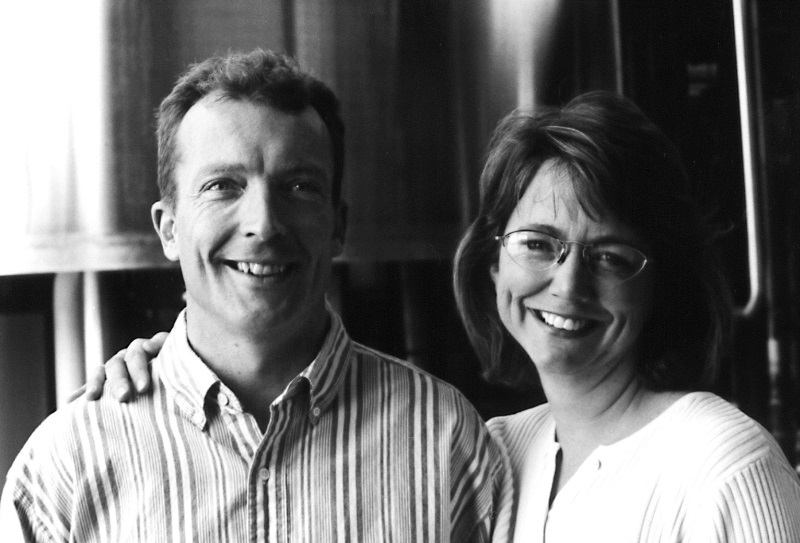New Belgium Brewing: From the Basement to Nationwide in 25 Years
By June 1991, Kim Jordan’s days off as a social worker began with calls to customers to see which beers they needed. She would then spend the afternoons delivering them around the greater Fort Collins, Colorado, area in her Toyota Tercel station wagon, picking up her son from first grade along the way (he would then do homework in the passenger’s seat). She usually finished deliveries in the early evenings, had dinner, and then headed out to Kinko’s to make marketing materials such as table tents.
These, just shy of 25 years ago now, were the earliest days of the New Belgium Brewing Co.
Jordan and then-husband Jeff Lebesch had conceived the idea for the brewery during bicycle trips through Belgium, that northern European kingdom famed for so many beer styles and brewing techniques. Lebesch’s first trip was solo, in 1988, when he was already a homebrewer.
They honed their business approach during a hike in Rocky Mountain National Park, taking along a jug of homebrew and a pen and paper. And, in early 1991, the couple, both then a few years past 30, started New Belgium out of their Fort Collins basement, with Lebesch as brewmaster and Jordan handling just about everything else.

Jeff Lebesch and Kim Jordan founded New Belgium Brewing Co. in 1991. (Photo courtesy New Belgium Brewing Co.)
The startup costs were roughly $60,000 in early 1990s coinage, a relatively low sum that Lebesch’s transferrable skills as both a homebrewer and an electrical engineer made possible. He was able to rig a lot of secondhand equipment, especially from dairies, to work for commercial brewing.
Both Jordan and Lebesch kept their day jobs into 1992, working at the brewery in the mornings, evenings, days off, weekends, vacations, etc. Even though smaller breweries such as theirs dotted whole swaths of the U.S., including Colorado, by the early 1990s—and a boom in brewpubs was well under way, too—success was far from assured.
It was not just the rigged nature of the brewing setup, or the essentially door-to-door salesmanship and distribution. Those did present their own challenges. But it was the Belgian styles that Lebesch and Jordan chose to lead with that was uniquely risky for the time.
Watery lagers loosely related to the Czech pilsner style then, as now, dominated the American beer marketplace. Then came everything else, including those that smaller operations like New Belgium brewed.
This everything else included the odd American-born steam beer or cream ale, but more often than not it sprung from styles born in what is now Germany—marzen that spawned so many Oktoberfest beers, for instance—and Great Britain. Think pale ales, India pale ales, porters, stouts, etc. The two best-selling smaller-batch beers to that point were Samuel Adams Boston Lager and Pete’s Wicked Ale, a brown ale that the brown ale from the Samuel Smith brewery in England inspired.
Belgian styles? Not so much, at least not domestically. Quality imports could be found in larger metropolitan areas, but otherwise Belgians in the very early 1990s in America were the playthings of dedicated enthusiasts, the importers themselves and critics. English and German styles were de rigueur for startups, not Belgian.
So out of step was New Belgium initially that the brewery literally defied categorization at the 1992 Great American Beer Festival, failing to fit into any designated styles for judging. In 1993, the festival added a catchall “Mixed, Specialty” category, and New Belgium’s Abbey Ale promptly won the gold. That beer, based on the Belgian dubbel style, was one of the brewery’s first offerings, along with a malty amber ale called Fat Tire, after those epiphanic bike rides.
These offerings helped New Belgium grow steadily. Lebesch and Jordan cleared about $150,000 in revenue their first year, and moved out of the basement in 1992 (the same year the pair quit their day jobs). In 1995, they moved New Belgium again, into its current Fort Collins facility. In April of this year, the brewery started shipping beer from its new East Coast operation in Asheville, North Carolina.

An aerial shot of New Belgium’s new brewery in Asheville, North Carolina. (Photo courtesy New Belgium Brewing Co.)
Lebesch retired from the brewery in 2001 (Peter Bouckaert has been the brewmaster since 1996), and Jordan stepped down as CEO in late 2015, moving into a new role as executive chair of the brewery’s board of directors.
Neither half of the founding couple, who divorced in 2009, own any of New Belgium anymore. That was intended. They gradually transitioned it into an employee-owned firm, having built it from below the ground up.
Read more Acitelli on History posts.
Tom Acitelli is the author of The Audacity of Hops: The History of America’s Craft Beer Revolution. His most recent book is a history of American fine wine called American Wine: A Coming-of-Age Story. Reach him on Twitter @tomacitelli.

I was wondering if I could have the name of the brewery Jeff first went to 1988? I have been on the tour a few times and that is always my favorite part of the story. I am traveling to Belgium this summer and as a loyal New Belgium-ist I would love to see this brewery in person and am having troubles Google searching the name of it. Thank you!
Bruges Beertje
Did Jeff ever live in Jacksonville Ill or have any Association with Jacksonville Ill ? A partner and I just opened the handlebar pizza and Pub in Jacksonville ill it’s a bicycle bar and fat tire is our main beer.